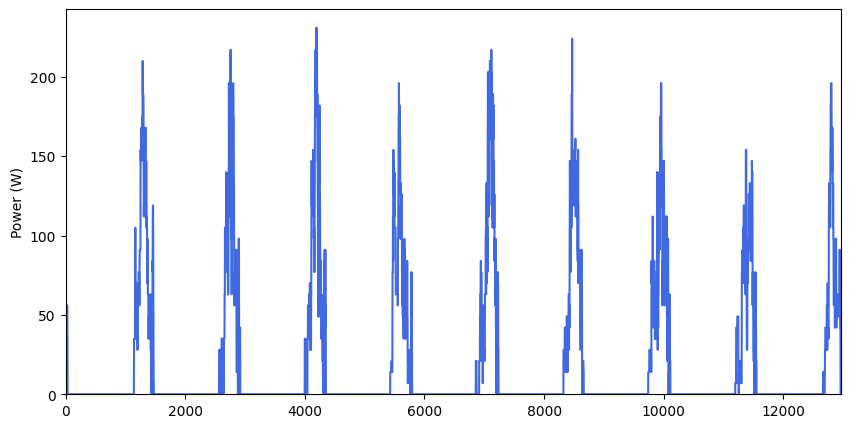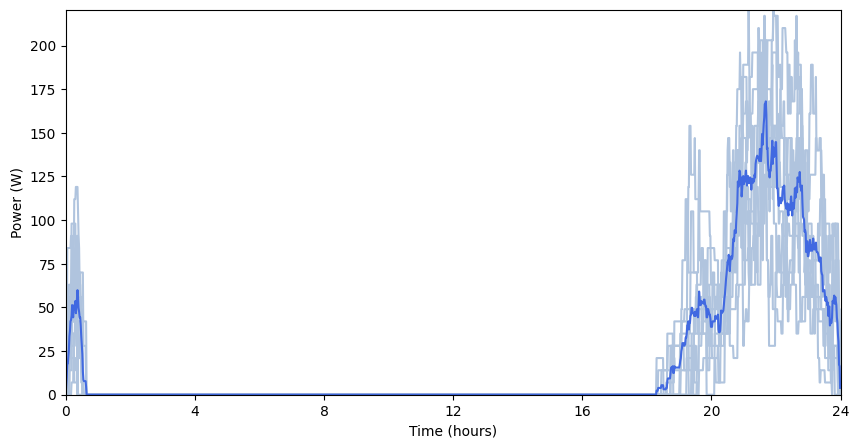Parallel processing¶
There is the possibility of generating UseCase profiles using parallel processing.
For example, to generate 365 profiles using a parallel process in shell,
use the -p option.
ramp -i <path to your input file> -p -n 365
The following cells provide you with a way to use the parallel process in a pure python code.
from ramp import UseCase
import numpy as np
import random
import math
import pandas as pd
from ramp.core.utils import calc_time_taken, get_day_type
from ramp import User, UseCase
from ramp.post_process import post_process as pp
use_case = UseCase(date_start="2022-01-01", date_end="2022-01-09", peak_enlarge=0.15)
household = User(
user_name="Household",
num_users=10,
)
indoor_bulb = household.add_appliance(
name="Indoor Light Bulb",
number=6,
power=7,
num_windows=2,
func_time=120,
time_fraction_random_variability=0.2,
func_cycle=10,
window_1=[1170, 1440], # from 19:30 to 24:00
window_2=[0, 30], # from 24 to 00:30
random_var_w=0.35,
)
use_case.add_user(household)
You will simulate 9 day(s) from 2022-01-01 00:00:00 until 2022-01-10 00:00:00
Run UseCase without parallel processing¶
daily_profiles = use_case.generate_daily_load_profiles(flat=False, verbose=True)
# Post-processes the results and generates plots
Profiles_avg, Profiles_list_kW, Profiles_series = pp.Profile_formatting(daily_profiles)
pp.Profile_series_plot(Profiles_series) # by default, profiles are plotted as a series
if (
len(daily_profiles) > 1
): # if more than one daily profile is generated, also cloud plots are shown
pp.Profile_cloud_plot(daily_profiles, Profiles_avg)
Day 1 / 9 completed
Day 2 / 9 completed
Day 3 / 9 completed
Day 4 / 9 completed
Day 5 / 9 completed
Day 6 / 9 completed
Day 7 / 9 completed
Day 8 / 9 completed
Day 9 / 9 completed
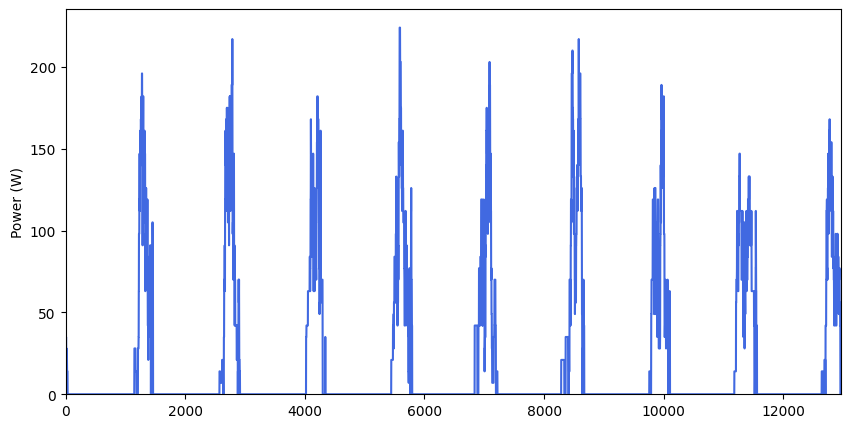
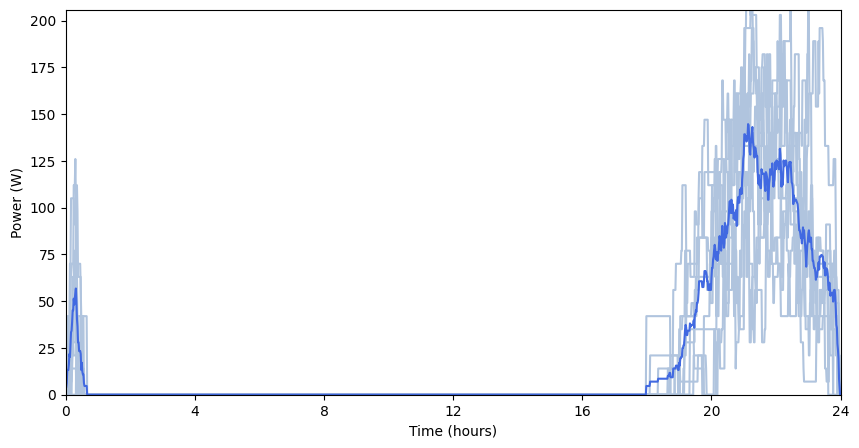
Run UseCase with parallel processing¶
Explicitly calling the parallel method
Profiles_list = use_case.generate_daily_load_profiles_parallel(flat=False)
# Post-processes the results and generates plots
Profiles_avg, Profiles_list_kW, Profiles_series = pp.Profile_formatting(Profiles_list)
pp.Profile_series_plot(Profiles_series) # by default, profiles are plotted as a series
if (
len(Profiles_list) > 1
): # if more than one daily profile is generated, also cloud plots are shown
pp.Profile_cloud_plot(Profiles_list, Profiles_avg)
Computing appliances profiles: 100%|████████| 90/90 [00:00<00:00, 1284.63unit/s]
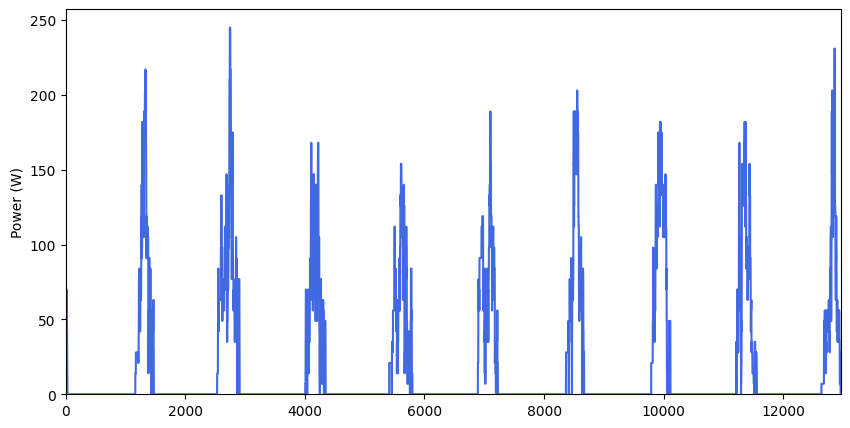
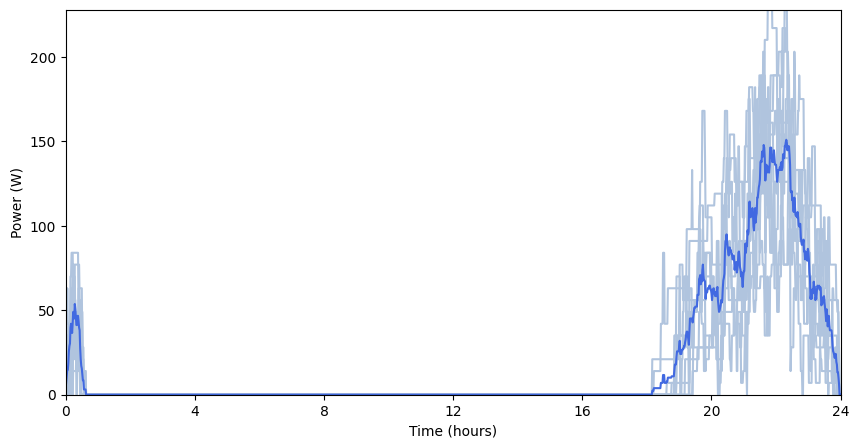
You can also set the parallel_processing attribute of the
UseCase instance to True and use the
generate_daily_load_profiles
use_case.parallel_processing = True
Profiles_list = use_case.generate_daily_load_profiles(flat=False)
# Post-processes the results and generates plots
Profiles_avg, Profiles_list_kW, Profiles_series = pp.Profile_formatting(Profiles_list)
pp.Profile_series_plot(Profiles_series) # by default, profiles are plotted as a series
if (
len(Profiles_list) > 1
): # if more than one daily profile is generated, also cloud plots are shown
pp.Profile_cloud_plot(Profiles_list, Profiles_avg)
Computing appliances profiles: 100%|████████| 90/90 [00:00<00:00, 1437.07unit/s]
